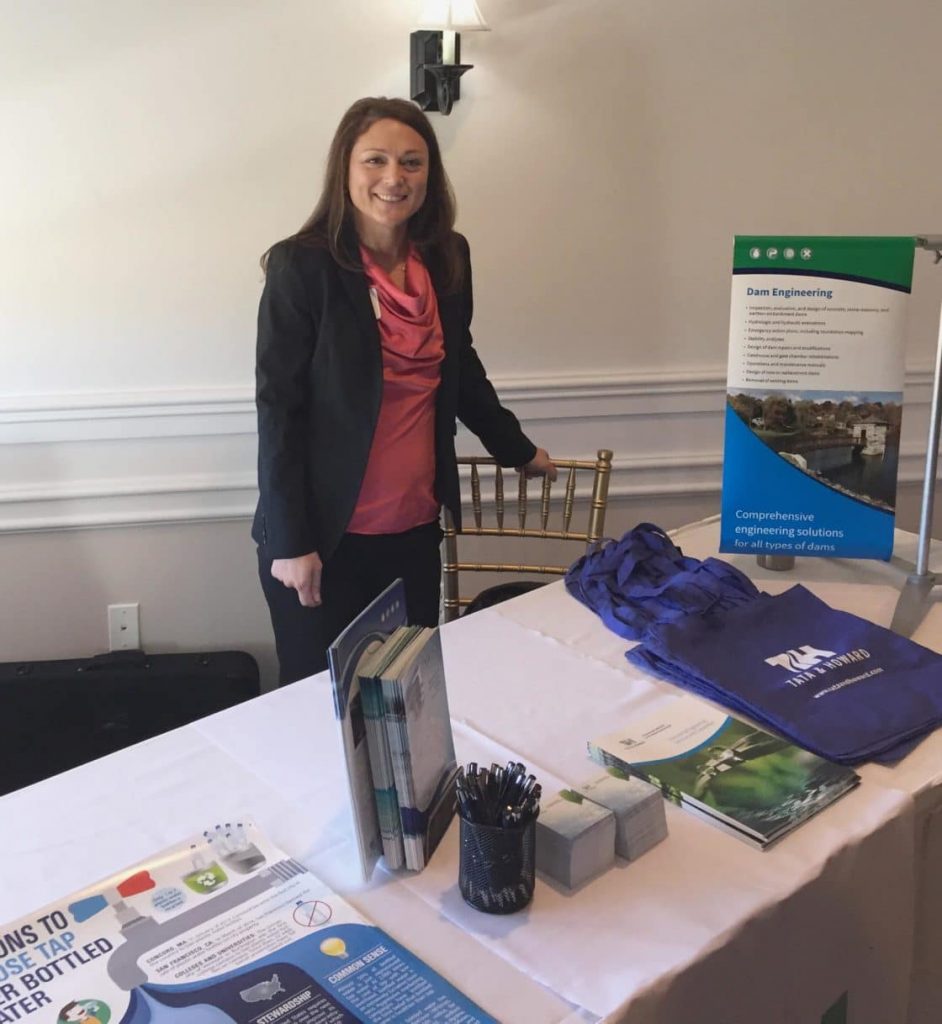
JANUARY 28, 2016 — We are at the Massachusetts Water Works Association membership meeting at Leicester Country Club today. In attendance are Karen Gracey, P.E., Vice President and Paul Howard, P.E., Senior Vice President. We’re here to talk water!

JANUARY 28, 2016 — We are at the Massachusetts Water Works Association membership meeting at Leicester Country Club today. In attendance are Karen Gracey, P.E., Vice President and Paul Howard, P.E., Senior Vice President. We’re here to talk water!
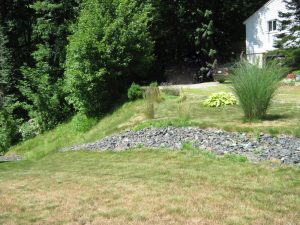 The December 2 briefing held at the State House was co-hosted by legislators Carolyn Dykema, State Representative for the Massachusetts 8th Middlesex District and Jamie Eldridge, Massachusetts State Senator representing the Middlesex and Worcester Districts. Jennifer Pederson, Executive Director for Massachusetts Water Works Association, was also in attendance.
The December 2 briefing held at the State House was co-hosted by legislators Carolyn Dykema, State Representative for the Massachusetts 8th Middlesex District and Jamie Eldridge, Massachusetts State Senator representing the Middlesex and Worcester Districts. Jennifer Pederson, Executive Director for Massachusetts Water Works Association, was also in attendance.
The draft permit received over 1,400 comments to which EPA is in the process of responding. Key points include the following:
The legislators in attendance expressed their concern over the costs to their communities to comply, particularly since their towns’ estimated costs for compliance were considerably higher than what EPA originally stated. While EPA said that costs could potentially be adjusted once the permit was released, they also affirmed that costs to communities with TMDLs or impaired waters would be significantly higher in order to sufficiently address water quality issues. However, EPA also stressed that the impending permit is strictly for planning purposes and will not require construction of Best Management Practices.
MassDEP noted that they are currently reviewing all changes that EPA proposes to make to the permit. DEP is particularly interested in seeing if comments that MassDEP Commissioner Marty Suuberg had previously submitted on the draft have been incorporated into the final permit.
Please feel free to contact us with any additional questions on the impending MS4 Permit.
To learn about our stormwater services, please click here.
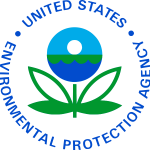 The U.S. Environmental Protection Agency (EPA) has awarded funds to all six New England states to help finance improvements to water projects that are essential to protecting public health and the environment. The funds will be primarily used to upgrade sewage plants and drinking water systems, as well as replacing aging infrastructure, throughout the state. Awards were made to the Clean Water State Revolving Fund (CWSRF) program in each state, which provides low-interest loans for water quality protection projects to make improvements to wastewater treatment systems, control pollution from stormwater runoff, and protect sensitive water bodies and estuaries; and to the Drinking Water State Revolving Fund (DWSRF) program in each state, which provides low-interest loans to finance improvements to drinking water systems, with a particular focus on providing funds to small and disadvantaged communities and to programs that encourage pollution prevention as a tool for ensuring safe drinking water.
The U.S. Environmental Protection Agency (EPA) has awarded funds to all six New England states to help finance improvements to water projects that are essential to protecting public health and the environment. The funds will be primarily used to upgrade sewage plants and drinking water systems, as well as replacing aging infrastructure, throughout the state. Awards were made to the Clean Water State Revolving Fund (CWSRF) program in each state, which provides low-interest loans for water quality protection projects to make improvements to wastewater treatment systems, control pollution from stormwater runoff, and protect sensitive water bodies and estuaries; and to the Drinking Water State Revolving Fund (DWSRF) program in each state, which provides low-interest loans to finance improvements to drinking water systems, with a particular focus on providing funds to small and disadvantaged communities and to programs that encourage pollution prevention as a tool for ensuring safe drinking water.
The awards are as follows:
Since the beginning of this program, EPA has awarded approximately $4.554 billion to New England states for the construction, expansion, and upgrading of clean water infrastructure resulting in decreased pollution entering waterbodies throughout the state.
As communities develop and climate patterns shift, water infrastructure needs are expected to grow. Green infrastructure is a cost-effective and resilient approach to water infrastructure needs that provides benefits to communities across the nation.
 The United States Drug Enforcement Agency (DEA) is hosting its 10th National Prescription Drug Take-Back Day on September 26th from 10am-2pm local time in every state except Pennsylvania and Delaware, where the event took place on September 12. Sites will be set up throughout communities nationwide so local residents can return their unwanted, unneeded, or expired prescription drugs for safe disposal.
The United States Drug Enforcement Agency (DEA) is hosting its 10th National Prescription Drug Take-Back Day on September 26th from 10am-2pm local time in every state except Pennsylvania and Delaware, where the event took place on September 12. Sites will be set up throughout communities nationwide so local residents can return their unwanted, unneeded, or expired prescription drugs for safe disposal.
Collection sites in every local community can be found by going to www.dea.gov . This site will be continuously updated with new take-back locations.
While National Prescription Drug Take-Back Day addresses the vital public safety and public health issue of prescription drug abuse, it also addresses the recently recognized problem of prescription medications found in our nation’s water supply. Many Americans do not know how to properly dispose of their unused medicines, often flushing them down the toilet, which causes a significant public health hazard.
In the previous nine Take-Back events nationwide from 2010-2014, 4,823,251 pounds, or 2,411 tons of drugs were collected.
Water Management Act (WMA) permits that expired between 2010 and 2015 were extended for four years by two Legislative Permit Extension Acts. Permit renewals are currently proceeding based on MassDEP’s schedule, although delays are expected. Basins with renewal applications on file will likely be extended, and correspondence will be sent. For renewals not yet on file, and particularly those not scheduled for renewal for several years, no determination has been made for extension.
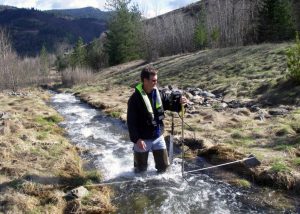
SWMI Sustainable Management Practices:
Demand Projections:
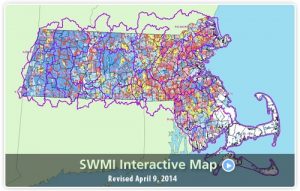
Baseline defined by MassDEP = higher of 2003-2005 average use plus 5%, or 2005 use plus 5%, provided that baseline cannot exceed the previous maximum authorized volume.
Mitigation programs required for systems using or requesting volumes greater than Baseline based on Tier classification of basin.
Minimization: All tiers of permittees with withdrawals in subbasins having August net groundwater depletion of 25% or greater must minimize the impact of their withdrawals in those subbasins. The minimization plan must be approved by DEP and should reflect the following three analyses:
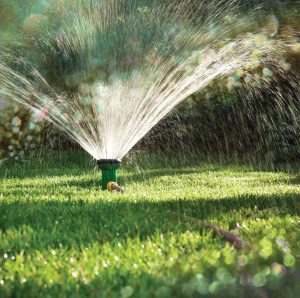 Coldwater Fishery Resource (CFR) Protection: All tiers of permittees with withdrawals that impact streamflow at a CFR must evaluate reducing impacts to CFRs through a desktop optimization. Tier 2 and Tier 3 applicants must evaluate further protection of their CFRs as part of their required mitigation planning.
Coldwater Fishery Resource (CFR) Protection: All tiers of permittees with withdrawals that impact streamflow at a CFR must evaluate reducing impacts to CFRs through a desktop optimization. Tier 2 and Tier 3 applicants must evaluate further protection of their CFRs as part of their required mitigation planning.
Alternative Source Analysis: Tier 3 permittees must show that they have no feasible alternative source that is less environmentally harmful.
Outdoor Water Use Restrictions: New outdoor water use restrictions will be required based on streamflow and or groundwater conditions, basin criteria and PWS compliance with performance standards. Limits include watering one or two days per week, no watering 9am to 5pm.
For more information on the SWMI final framework, please visit MassDEP’s website here. For questions or assistance with SWMI or WMA, please contact us.
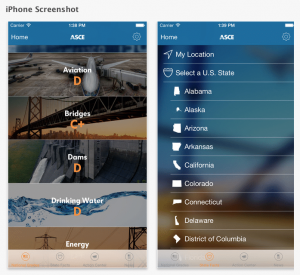 The American Society of Civil Engineers (ASCE) released a new app for Android and iPhone called Save America’s Infrastructure. The app, which was originally released during Infrastructure Week, describes America’s aging infrastructure issues while providing a way to take action by contacting elected leaders directly through the app. Save America’s Infrastructure app offers infrastructure grades, facts on 16 categories, pertinent news, and an action center. Providing easy reference to the 2013 Report Card for America’s Infrastructure grades and state facts, the app is absolutely free to download. It also provides local information, where users are able to input their zip code to learn about deficiencies in their own area.
The American Society of Civil Engineers (ASCE) released a new app for Android and iPhone called Save America’s Infrastructure. The app, which was originally released during Infrastructure Week, describes America’s aging infrastructure issues while providing a way to take action by contacting elected leaders directly through the app. Save America’s Infrastructure app offers infrastructure grades, facts on 16 categories, pertinent news, and an action center. Providing easy reference to the 2013 Report Card for America’s Infrastructure grades and state facts, the app is absolutely free to download. It also provides local information, where users are able to input their zip code to learn about deficiencies in their own area.
Key features include the following:
“As stewards of our nation’s infrastructure, civil engineers are the experts on America’s roads, bridges, water pipes, sewers and dams, and we know that these systems are aging,” said Robert D. Stevens, P.E., Ph.D., President of ASCE. “Right now couldn’t be a better time to take advantage of this resource. Congress needs to find a way to fix the Highway Trust Fund with a long-term, sustainable funding source. This app allows people to contact their Senators and Representative and tell them why it matters.”
 The Massachusetts Department of Environmental Protection (MassDEP) has announced a new online data management system for Underground Storage Tank (UST) registrations and third-party inspections (TPIs). As of August 1, 2015, MassDEP will no longer accept paper UST forms FP-290, FP-290R and FP-289 and will instead require all registrations and inspections to be filed electronically.
The Massachusetts Department of Environmental Protection (MassDEP) has announced a new online data management system for Underground Storage Tank (UST) registrations and third-party inspections (TPIs). As of August 1, 2015, MassDEP will no longer accept paper UST forms FP-290, FP-290R and FP-289 and will instead require all registrations and inspections to be filed electronically.
In preparation for the new requirement, MassDEP will be offering a webinar on “Data Management System Training for UST Owners, Operators, and Third-Party Inspectors” beginning on July 15. In addition, they will be offering hands-on training sessions for UST system owners, operators, and staff responsible for preparing and/or submitting UST registration documents, TPI reports, and compliance certifications. These training sessions, which require advance registration, will be offered in Fall River, Holyoke, Worcester, and Danvers. For your convenience, the original MassDEP press release is copied below in its entirety.
If you have any questions or require assistance with TPIs or compliance certifications, please contact Jonathan O’Brien, LSP, LEP at 508-386-9338 or jobrien@tataandhoward.com.
Original letter from MassDEP:
Dear Class A, A/B and B Operators and Third-Party Inspectors:
Beginning in July, MassDEP is transitioning from the current paper based Underground Storage Tank (UST) Program registration and reporting forms (FP-290, FP-290R and FP-289), to a new online data management system that provides UST system owners and operators a more convenient, electronic way to update facility registration information and submit applicable reporting documents.
The new data management system will be available for user registration by mid-July. MassDEP will notify all Class A, A/B and B operators and third-party inspectors when the data management system is ready for use.
UST Program Reporting Transition Schedule
Compliance with Third-Party Inspection Reporting Requirements
To provide UST system owners, operators and third-party inspectors time to register as users in the data management system and become familiar with the system and new Program requirements, TPI Reports due between August 1, 2015 and October 31, 2015 will be allowed up to October 31, 2015 to submit their required TPI Report using the new online data management system.
All TPI Reports for this period received after October 31, 2015 may be subject to enforcement.
Compliance Certification Submittals
The Compliance Certification submittal requirement goes into effect November 1, 2015. MassDEP will issue 90-Day Reminder notifications in July to UST system owners and operators with Compliance Certifications due in November 2015.
Data Management System Training for UST Owners, Operators, and Third-Party Inspectors
Webinar Training Dates
No pre-registration is required to participate. Further information on webinar call-in number and conferencing service will be emailed to all TPIs prior to date of scheduled training and posted on MassDEP’s UST webpage.
This is “hands on” training for UST systems owners, operators and staff responsible for preparing and/or submitting UST registration documents, TPI Reports and Compliance Certifications.
Space is limited and available on a first come, first serve basis (system owners and operators with most imminent submittal due dates will receive priority). Additional sessions will be added as demand requires.
To reserve space, please submit your name, company, and preferred date and session to: dep.ust@state.ma.us.
| Date | July 17, 2015 | July 21, 2015 | July 27, 2015 | July 28, 2015 |
| Facility | Bristol CC | Holyoke CC | Worcester State University | North Shore CC |
| City/Town | Fall River, MA | Holyoke, MA | Worcester, MA | Danvers, MA |
| Room Capacity | 28 | 23 | 25 | 18 |
| Session #1 | 10am – Noon | 10am – Noon | 10am – Noon | 10am – Noon |
| Session #2 | 1pm – 3pm | 1pm – 3pm | 1pm – 3pm | 1pm – 3pm |
Data Management System Training Materials on MassDEP’s Webpage
The following materials will be posted on MassDEP’s UST webpage (https://www.mass.gov/eea/agencies/massdep/toxics/ust/) at the time the UST Data Management System goes “live”.
If you have any questions concerning the introduction of the new UST online Data Management System, please email the Program at: dep.ust@state.ma.us, or call the MassDEP UST Program Hotline at (617) 556-1035 Ext. 2.
Tom DeNormandie, Branch Chief
Massachusetts Department of Environmental Protection
Underground Storage Tank/Stage I & II Vapor Recovery Programs
One Winter Street – 7th floor
Boston, MA 02108
Phone: 617-292-5763
Fax: 617-556-1063
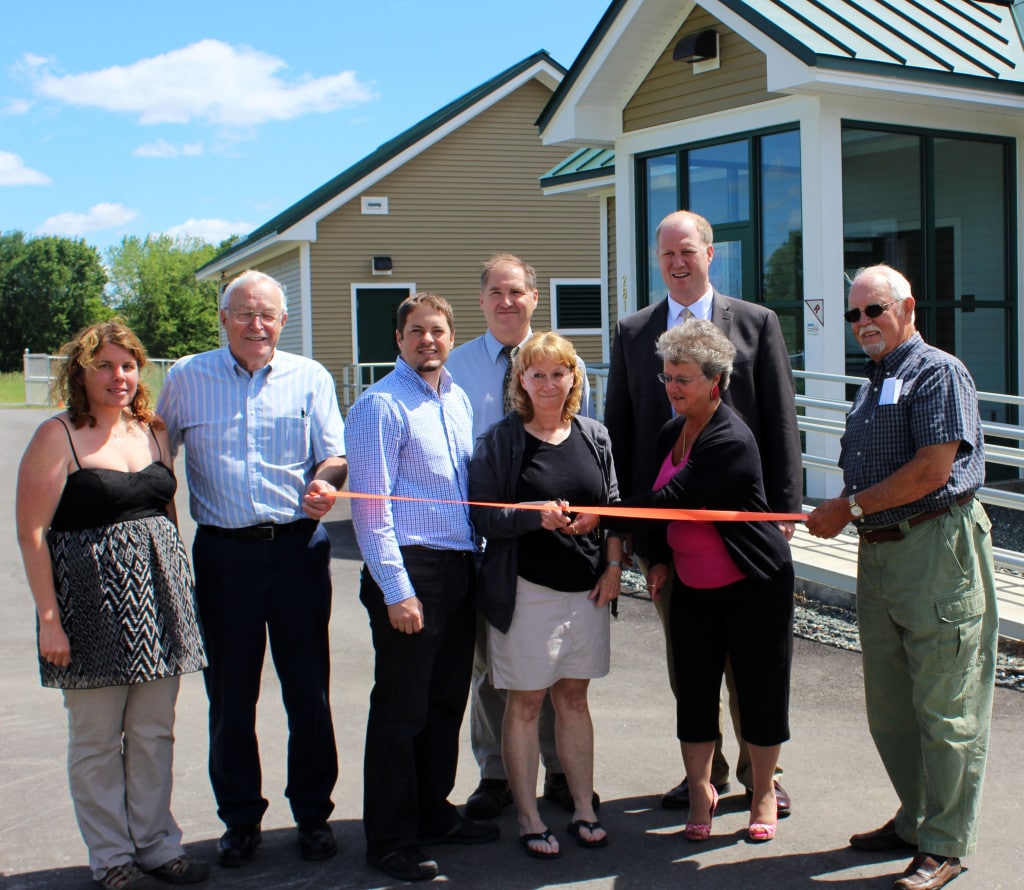
The towns of Canaan, VT and Stewartstown, NH celebrated the completion of their shared $4.1 million wastewater treatment plant with a ribbon-cutting ceremony on Thursday, June 25, in Canaan. The total cost of the facility improvements was $4.12 million and the towns received $2.41 million in grant money as well as a $1.69 million low interest loan from the U.S. Department of Agriculture (USDA) Rural Development. The new system replaces a decades-old facility that was costly to operate and did not meet state and federal water quality standards.
Tata & Howard, Inc. provided complete consulting engineering services for the design and construction of the wastewater treatment facility project that consisted of a complete upgrade of four pump stations and the 0.185-MGD, 3-cell lagoon wastewater treatment facility. The upgrades provide the towns with a state-of-the-art, reliable wastewater treatment facility that meets stringent Effluent Discharge limits to the Connecticut River and allows for a more efficient treatment process. The new influent screening and grit removal processes extend the life of the treatment facility components, and septage receiving allows for additional income and also provides service to the other residents of the town that are not on public sewer. The design incorporated numerous energy efficient features, including variable-frequency drives on all motors and aeration blowers, a wood pellet boiler for heat, energy efficient windows, and insulated concrete block walls, resulting in a reduction in annual operation and maintenance costs. The pump stations were upgraded to eliminate the operator from entering below grade structures and allow for low-cost future replacement.
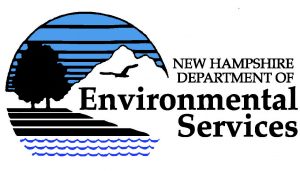 NHDES Leak Detection Survey Grant Application for Community Water Systems, Water Division/Drinking Water and Groundwater Bureau
NHDES Leak Detection Survey Grant Application for Community Water Systems, Water Division/Drinking Water and Groundwater Bureau
The New Hampshire Department of Environmental Services (NHDES) is pleased to announce the opening of the grant application period for the 2015/2016 Community Water System Leak Detection Survey grant. Applications will be accepted through 4:00 pm on July 17, 2015. Community water systems in New Hampshire are encouraged to send the below grant application to NHDES for consideration to receive a free acoustic leak detection survey during the 2016 field season. Proactive leak detection and repair can reduce a water system’s pumping and treatment costs, provide an opportunity to better manage and prioritize system projects, and protect water supply quality and quantity.
Leaks may be found on water mains, service lines, hydrants and valves. While some leaks are easy to identify as they are visible, there are many leaks that go unseen – from smaller leaks to leaks in well-drained soils to those that find their way underground into a storm drain. Through a competitive bid process, a professional leak detection specialist will be retained by NHDES to identify these difficult-to-find leaks using mechanical and electronic listening equipment to detect leakage sounds and pinpoint leaks.
To be considered for a leak detection survey, by no later than July 17, 2015 by 4:00 PM, please submit a complete grant application to Kelsey Vaughn via e-mail at kelsey.vaughn@des.nh.gov or by mail:
NHDES – Drinking Water & Groundwater Bureau
Water Use & Conservation Program
c/o Kelsey Vaughn
29 Hazen Drive, PO Box 95
Concord, NH 03302-0095
Leak detection is one component of a complete water system asset management program, and is one of the quickest ways to recover lost water and reduce revenue losses. However, in combination with a leak detection program, a water audit can further help water utilities reduce water and revenue losses, make better use of water resources, and reduce or eliminate the need for upgrades and expansions. For more information on water audits, please click here.
You may download the NHDES grant application here: NHDES Leak Detection Survey Grant Application
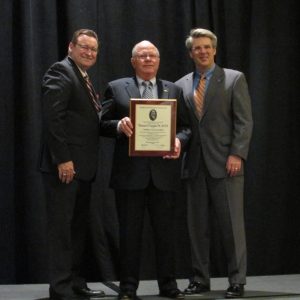
On Wednesday, June 10, 2015, during the American Water Works Association (AWWA) 2015 Annual Conference and Exposition (ACE15) in Anaheim, California, Tata & Howard’s Thomas R. Morgan, P.E., BCEE, was presented with the George Warren Fuller Award for the New England section.
George Warren Fuller Awards are presented annually by the AWWA to the sections’ selected members for their distinguished service to the water supply field in commemoration of the sound engineering skill, brilliant diplomatic talent, and constructive leadership which characterized the life of George Warren Fuller. Tom was presented with an award plaque and pin at the Fuller Award Society Breakfast held during ACE15. Each awardee becomes a member of the George Warren Fuller Award Society of the AWWA. The annual meeting of the society is held at the Fuller Award Society Breakfast at the AWWA Annual Conference and Exposition.